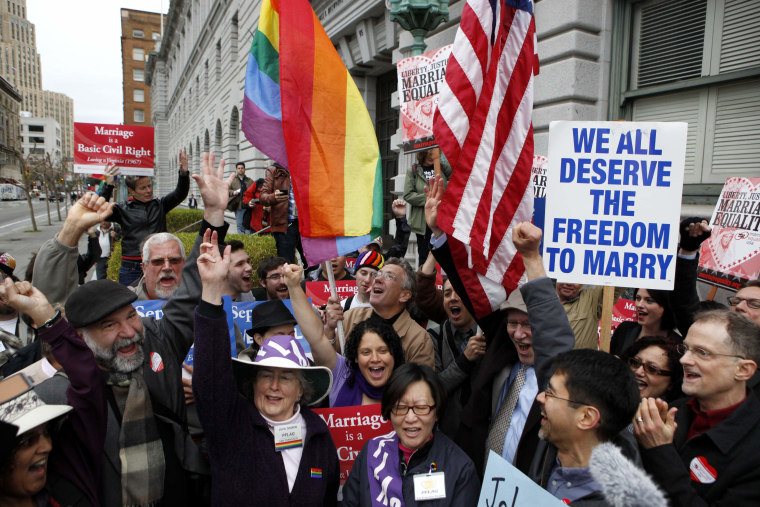Brown v. Board of Ed. – 1954.Roe v. Wade – 1973.Windsor v. U.S. – 2013?
Over the years, this country has consistently, albeit sometimes slowly, moved toward expanding civil liberties. And the latest announcement from the Supreme Court could lead to the culmination of yet another major shift in American society.
June 2013. That is the approximate time-frame for when the nation can expect to have a decision from the Supreme Court on two major gay marriage cases.
The high court agreed Friday to hear Windsor v. United States and Hollingsworth v. Perry—a pair of cases that argue the constitutionality of two different pieces of anti-gay marriage legislation, one at the federal level and one at the state level.
At the federal level, Windsor v. United States tackles the Defense of Marriage Act. DOMA, signed into law in 1996 by President Clinton, defines marriage as a legal union between one man and one woman, and denies some 1,000 federal benefits to all same-sex couples—even those legally married in their own state. Edith Windsor, 83, first brought the case to trial when she was hit with roughly $600,000 in estate taxes after her partner of 40 years died.
And at the state level, the constitutionality of California’s Proposition 8 is being called into question. Prop 8 is a voter-approved referendum that revoked same-sex marriage rights from California residents after those rights had already been approved by state courts and lawmakers.
The stakes are high in both cases, but there's a solid argument to be made for why the Prop 8 case could turn out to be even further-reaching than the federal one. As the Washington Post's Greg Sargent wrote:
If the Supreme Court adopts a broad ruling that Prop 8 is unconstitutional because it violates the due process and equal protection clauses of the constitution — as opposed to a narrower ruling that can only be applied in California — that will effectively enshrine the federal constitutional right to marry, meaning it’s only a matter of time until all state statutes banning gay marriage are ruled unconstitutional.
Chad Griffin of the Human Rights Campaign sees the court’s latest move to rule on gay marriage as reason to rejoice.
“I’m optimistic that once the court hears this case and sees the evidence that was presented at trial, they, as they have so many times in our nation’s past, will come down on the side of freedom and equality,” he told msnbc's Andrea Mitchell.
But as many supporters of marriage equality celebrate, one can’t help but wonder why so many on the opposite side of the issue were pleased with Friday’s announcement.
“I’m ecstatic,” said Brian S. Brown, the president of the National Organization for Marriage. “Taking both cases at the same time exposes the hypocrisy on the other side.”
Brown and fellow NOM members expect that the Supreme Court will uphold Proposition 8, and pave the way for more states to issue bans on same-sex marriage.
No matter the court's ruling, the tide is turning toward equal rights, as last month's election alone saw four more states rule in favor of gay marriage. Maryland, Maine and Washington voted to legalize marriage equality and Minnesota rejected a proposed ban on it.
The court is expected to begin hearings in March.
